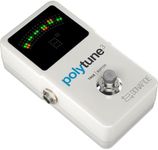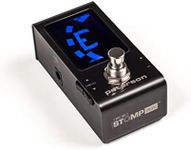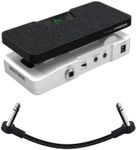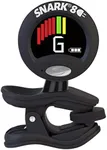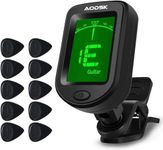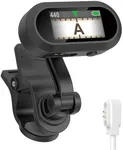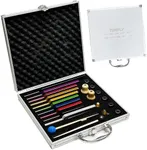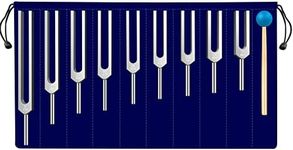Buying Guide for the Best Tuner Pedals
When it comes to choosing a tuner pedal, it's important to consider your specific needs as a musician. Tuner pedals are essential for ensuring your instrument is in tune, which is crucial for achieving the best sound quality. There are several key specifications to consider when selecting a tuner pedal, and understanding these can help you make an informed decision that best suits your playing style and requirements.AccuracyAccuracy refers to how precisely the tuner can detect and display the pitch of your instrument. This is important because even slight deviations in tuning can affect the overall sound quality. Accuracy is usually measured in cents, with lower values indicating higher precision. For most musicians, an accuracy of +/- 1 cent is sufficient, but professional musicians or those with highly trained ears might prefer a tuner with an accuracy of +/- 0.1 cent.
DisplayThe display on a tuner pedal shows the pitch information and helps you tune your instrument. A clear and easy-to-read display is crucial, especially in low-light conditions on stage. Displays can range from simple LED lights to more advanced LCD screens with color indicators. If you often perform in dimly lit environments, look for a tuner with a bright, high-contrast display. For home practice, a simpler display might suffice.
Tuning ModesTuning modes refer to the different ways a tuner can detect and display pitch. Common modes include chromatic, guitar, bass, and polyphonic tuning. Chromatic tuners can detect all 12 notes of the musical scale, making them versatile for various instruments. Guitar and bass modes are tailored specifically for those instruments, while polyphonic tuners can detect multiple strings at once. Choose a tuner with modes that match your instrument and playing style.
Bypass TypeBypass type determines how the tuner pedal affects your signal chain when it's not in use. True bypass means the signal passes through the pedal without any alteration, preserving your tone. Buffered bypass, on the other hand, can help maintain signal strength over long cable runs but may slightly alter your tone. If you have a simple setup, true bypass might be preferable. For more complex setups with long cables, a buffered bypass could be beneficial.
Power SupplyTuner pedals can be powered by batteries or an external power supply. Battery-powered tuners offer portability and convenience, but you need to keep spare batteries on hand. External power supplies provide consistent power and are ideal for pedalboards. Consider your setup and how often you perform when deciding on the power supply. If you frequently gig, an external power supply might be more reliable.
Size and Build QualityThe size and build quality of a tuner pedal can affect its durability and ease of use. Compact pedals save space on your pedalboard but may have smaller displays. Larger pedals often have more features and easier-to-read displays. Build quality is important for longevity, especially if you gig frequently. Look for a pedal with a sturdy construction that can withstand the rigors of live performance.


